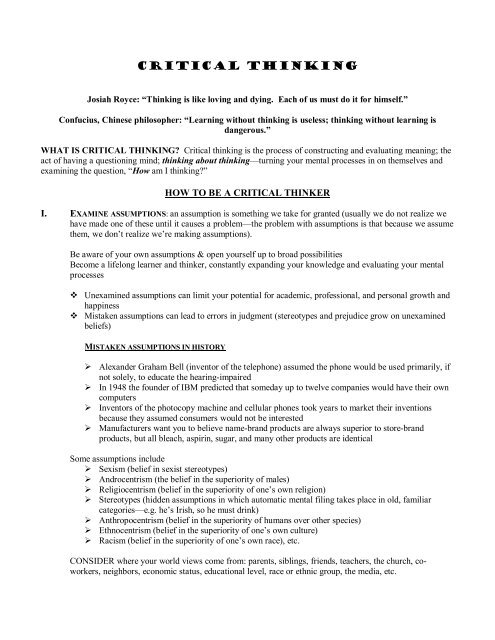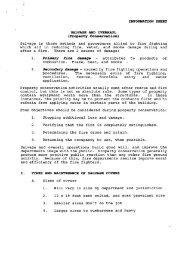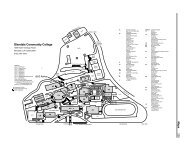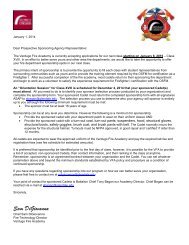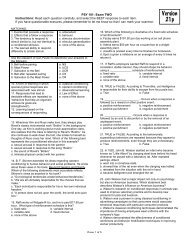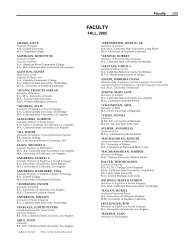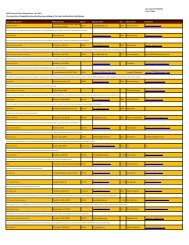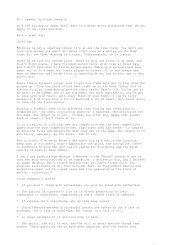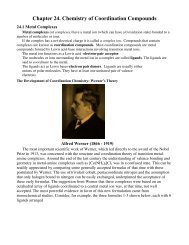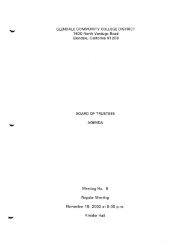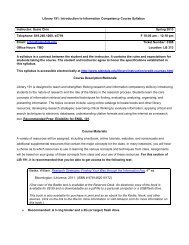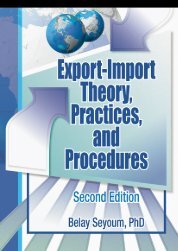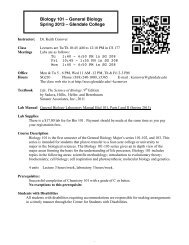Critical Thinking Skills - Glendale Community College
Critical Thinking Skills - Glendale Community College
Critical Thinking Skills - Glendale Community College
Create successful ePaper yourself
Turn your PDF publications into a flip-book with our unique Google optimized e-Paper software.
CRITICAL THINKING<br />
Josiah Royce: “<strong>Thinking</strong> is like loving and dying. Each of us must do it for himself.”<br />
Confucius, Chinese philosopher: “Learning without thinking is useless; thinking without learning is<br />
dangerous.”<br />
WHAT IS CRITICAL THINKING? <strong>Critical</strong> thinking is the process of constructing and evaluating meaning; the<br />
act of having a questioning mind; thinking about thinking—turning your mental processes in on themselves and<br />
examining the question, “How am I thinking?”<br />
HOW TO BE A CRITICAL THINKER<br />
I. EXAMINE ASSUMPTIONS: an assumption is something we take for granted (usually we do not realize we<br />
have made one of these until it causes a problem—the problem with assumptions is that because we assume<br />
them, we don’t realize we’re making assumptions).<br />
Be aware of your own assumptions & open yourself up to broad possibilities<br />
Become a lifelong learner and thinker, constantly expanding your knowledge and evaluating your mental<br />
processes<br />
v Unexamined assumptions can limit your potential for academic, professional, and personal growth and<br />
happiness<br />
v Mistaken assumptions can lead to errors in judgment (stereotypes and prejudice grow on unexamined<br />
beliefs)<br />
MISTAKEN ASSUMPTIONS IN HISTORY<br />
‣ Alexander Graham Bell (inventor of the telephone) assumed the phone would be used primarily, if<br />
not solely, to educate the hearingimpaired<br />
‣ In 1948 the founder of IBM predicted that someday up to twelve companies would have their own<br />
computers<br />
‣ Inventors of the photocopy machine and cellular phones took years to market their inventions<br />
because they assumed consumers would not be interested<br />
‣ Manufacturers want you to believe namebrand products are always superior to storebrand<br />
products, but all bleach, aspirin, sugar, and many other products are identical<br />
Some assumptions include<br />
‣ Sexism (belief in sexist stereotypes)<br />
‣ Androcentrism (the belief in the superiority of males)<br />
‣ Religiocentrism (belief in the superiority of one’s own religion)<br />
‣ Stereotypes (hidden assumptions in which automatic mental filing takes place in old, familiar<br />
categories—e.g. he’s Irish, so he must drink)<br />
‣ Anthropocentrism (belief in the superiority of humans over other species)<br />
‣ Ethnocentrism (belief in the superiority of one’s own culture)<br />
‣ Racism (belief in the superiority of one’s own race), etc.<br />
CONSIDER where your world views come from: parents, siblings, friends, teachers, the church, coworkers,<br />
neighbors, economic status, educational level, race or ethnic group, the media, etc.
II.<br />
DISTINGUISH BETWEEN FACT AND OPINION<br />
Facts can be objectively verified or proven through the testimony of witnesses, records, documentation,<br />
measurement by instruments, etc. An opinion is a judgment, unsubstantiated belief or conclusion, or a<br />
sentiment or feeling on a topic. Writers may slip in opinion with fact, confusing the uncritical reader, who<br />
won’t question whether the opinions are valid. The boldfaced sections of the sentences below reflect<br />
OPINION (judgments, not facts).<br />
As a general, Washington was not a brilliant strategist like Napoleon.<br />
The age of the average soldier serving in Vietnam was 19, compared with 26 for World War II. (All fact)<br />
On April 4, 1968, Martin Luther King, Jr. traveled to Memphis to lead a demonstration in support of<br />
striking sanitation workers; he was assassinated that same day. (All fact)<br />
In fact, Ross Perot was clearly the best candidate in the 1992 presidential race.<br />
The movie Pulp Fiction, released in 1995, starred Samuel L. Jackson and John Travolta along with a<br />
supremely talented cast in a story so cleverly crafted that it will surely go down in history as a classic.<br />
III.<br />
DETERMINE VALIDITY OF PASSAGE<br />
A. Who is the author? What are his/her/their credentials? Are they authorities?<br />
B. Could the author(s) be biased? Are they paid by people who have a vested interest in what people<br />
think about the subject?<br />
C. How recent is the article? In some subject areas, an article that’s a year old could already be out of date<br />
(it depends on the subject).<br />
IV.<br />
UNDERSTAND THE AUTHOR’S PURPOSE<br />
A. Determine patterns of organization: description, narration, cause & effect, comparison, contrast,<br />
classification, process, definition, chronological order, illustration & example. This will help you<br />
determine what the author wants to get across (reasons, ways in which two things are different,<br />
etc.) and will also help you pick out main ideas and major supporting details.<br />
B. Be clear on the writer’s definitions. Determine whether what he is calling a concept or thing is the<br />
same thing you have in mind when you read the word.<br />
V. BEWARE OF MANIPULATIVE STATISTICS OR MISLEADING INFORMATION<br />
A. In each set below, the facts contained within both of the paired statements are true:<br />
‣ Enriched white bread is more nutritious than wholewheat bread because it contains as much or<br />
more protein, calcium, niacin, thiamin, and riboflavin.<br />
‣ Wholewheat bread is more nutritious than white bread because it contains seven times the amount<br />
of fiber, plus more iron, phosphorus, and potassium.<br />
‣ The cheetah, clocked at 70 miles per hour, is the fastest animal in the world.<br />
‣ The pronghorn antelope, clocked at 61 miles per hour, is the fastest animal in the world.
Which is true? It depends on what you’re measuring; in the first example, what do you want out of the<br />
bread? In the second case, the cheetah does go faster, but only for short sprints, whereas the antelope can<br />
maintain its high speed over a much greater distance. By being selective about information, a writer can<br />
manipulate the reader with “facts.”<br />
B. Consider the following statistics:<br />
In 1947, President Harry Truman earned a salary of $75,000.<br />
In 1967, President Lyndon b. Johnson earned a salary of $100,000.<br />
In 1997, President Bill Clinton earned a salary of $200,000.<br />
(Put in 1967 dollars, the above presidents earned, respectively, $104,000, $100,000, and $59,000,<br />
so by comparing apples to apples, in terms of cost of living at the time and such, Clinton made the<br />
least and Truman made the most.)<br />
VI.<br />
READ BETWEEN THE LINES! PICK UP ON WORD CONNOTATIONS AND POSSIBLE SLANTED<br />
OR BIASED LANGUAGE (e.g. euphemisms, doublespeak, sneer words, etc.). Consider the following paired<br />
words (with roughly the same meaning, but a very different feeling. One word will feel more negative than<br />
the other.<br />
Smut vs. erotica<br />
Swamp vs. wetland<br />
Motionless vs. passive<br />
Loiter vs. wait<br />
Macho vs. Masculine<br />
Energetic vs. Frenetic<br />
Consider these two passages (both on the same concept of Westward migration, but with a different slant):<br />
John Steinbeck, from “The Westward Migration”: The railroads brought new hordes of landcrazy people,<br />
and the new Americans moved like locusts across the continent until the western sea put a boundary to their<br />
movements. Coal and copper and gold drew them on; they savaged the land, golddredged the rivers to<br />
skeletons of pebbles and debris.<br />
Ray Allen Billington, from The American Story: Opportunity was the magnet that drew men westward<br />
during those three centuries, for nature’s untapped riches promised pioneers the fortunes that fate had<br />
denied them in older societies. There, where a king’s ransom in furs could be had for the taking, where<br />
lush grasslands beckoned the herdsman, where fortunes in gold and silver lay scarcely hidden, where virgin<br />
soils awaited only the magic touch of man to yield their wealth . . . .These shock troops of civilization made<br />
little impression on the wilderness; instead they adapted themselves so completely to the forest<br />
environment that they altered the face of the country but slightly.<br />
See if you can pick out the words that make the first passage sound negative and the second sound positive.<br />
VII.<br />
INTERPRET TONE<br />
Examples of tone: straightforward & objective, amused, sentimental, pessimistic, fearful, critical, mocking,<br />
malicious, impassioned, solemn, etc. Irony is important to detect. If you don’t pick up on sarcasm, the<br />
whole point of an article may be lost.<br />
VIII.<br />
LEARN TO INFER (an inference is a conclusion one can draw from a passage or set of ideas although the<br />
conclusion was never directly stated—read between the lines.)
IX.<br />
LOOK FOR (AND AVOID IN YOUR OWN WRITING) ARGUMENT ERRORS<br />
A. HASTY GENERALIZATION (jumping to conclusions based on too few examples)<br />
‣ Two Chinese girls took an art course with me last semester, and they were the best students in the<br />
class. Obviously, the Chinese people have a natural talent for art.<br />
‣ One nonsmoker, interviewed at a restaurant, said, “I can eat dinner just fine even though people<br />
around me are smoking.” Another, responding to a Los Angeles Times survey, said, “I don’t see<br />
what all the fuss is about. My wife has smoked for years and it has never bothered me.” We can<br />
see, then, that secondhand smoke does not cause a problem for most nonsmokers.<br />
‣ Several of my math instructors have been Asian, and all of them are brilliant. It only makes sense<br />
to conclude that all Asians are brilliant mathematicians.<br />
B. FALSE CAUSE (attributing an effect to an event when the two aren’t exactly a cause/effect<br />
relationship)<br />
‣ The waiter went off duty early, and then the vase was discovered missing, so he must have stolen<br />
it.<br />
‣ The Asian flu will be worse than usual in the Bay area this year. That’s because San Francisco has<br />
such a large Asian population. (the Asian flu is not caused by Asian people)<br />
‣ Since Senator Nelson was elected, the world has moved steadily toward peace and democracy.<br />
What better reason can there be to reelect him? (Is he the reason for more peace in the world?)<br />
‣ There can be no doubt that the Great Depression was caused by Herbert Hoover. He became<br />
president in March 1929, and the stock market crashed just seven months later. (One man can’t<br />
cause such a major catastrophe so quickly after getting into office).<br />
C. RED HERRING (changing the subject) (This error in logic is called “red herring” because escaping<br />
prisoners used to drag a red herring across the path they had been running on to throw the dogs off<br />
their scent—the dogs would stop following the prisoner’s scent and follow the smell of the<br />
herring.)<br />
‣ Phil would make a good salesman. He was an excellent halfback in college and has extensive<br />
factory experience. (Do Phil’s past football victories or experience in a factory mean he has the<br />
ability to sell?)<br />
‣ Why should we worry about the amount of violence on television when thousands of people are<br />
killed in automobile accidents each year?<br />
‣ It’s ridiculous to worry about protecting America’s national parks against pollution and overuse<br />
when innocent people are being killed by domestic terrorists. (Yes, innocent people are killed by<br />
terrorists, but a problem with pollution and overuse of parks ALSO exists and can’t be ignored just<br />
because other problems exist.)<br />
D. PERSONAL ATTACK—(“ad hominem”—the Latin phrase meaning “against the man”—it involves<br />
attacking the person rather than attack on ideas—this error also includes namecalling)<br />
‣ No one should vote for Senator Snow even if his proposal to improve the state’s transportation<br />
system seems sensible. Last year his wife accused him of having an affair, and now I hear his<br />
marriage is rocky. (The attack is personal and has nothing to do with his ability as a senator)<br />
‣ I can’t support Representative Frey’s proposal for campaign finance reform. After all, he was<br />
kicked out of law school for cheating on an exam. (You can’t base your vote on a specific issue<br />
based on a man’s past conduct—if his idea is sound, ignore the man’s personal flaws.)
‣ The governor has a number of interesting economic proposals, but let’s not forget that she comes<br />
from a very wealthy family. (You can’t assume that her economic ideas aren’t sound just because<br />
she came from money.)<br />
‣ Of course you believe that. You’re a (fillinthe blank: woman, Catholic, Southerner,<br />
businessperson).<br />
‣ I should have expected this from a treehugger (or bleedingheart liberal, Biblethumper, simpleminded<br />
bastard).<br />
‣ That artist is so unpleasant. I don’t like the way she looks.<br />
E. EITHEROR (the issue is black or white—no inbetween is considered)<br />
‣ The government must either raise taxes or reduce services for the poor.<br />
‣ Either we build a new high school or children in this community will never get into college.<br />
‣ Police officers are either brutal or corrupt.<br />
‣ If we do not have universal and total nuclear disarmament now, we face the certainty of a<br />
worldwide nuclear disaster.<br />
‣ A married woman should stay home and devote herself to raising children. If she really wants<br />
children, she shouldn’t attempt a career. (Is there no compromise possible here?)<br />
F. BANDWAGON (“everyone” agrees with it—a.k.a. Appeal to popular opinion)<br />
‣ I don’t see any reason to wear a helmet when I ride a bike. Everyone bikes without a helmet.<br />
‣ More hospitals use Tylenol than Advil to relieve the patients’ aches and pains. (Maybe they get a<br />
deal—don’t assume that fact makes Tylenol better than Advil.)<br />
‣ Vanderbilt General Insurance Company, the Big Company with the Big Heart—50,000 customers<br />
can’t be wrong! (Remember ~ everyone USED to think the world was flat—that didn’t make it<br />
right.)<br />
G. SLIPPERY SLOPE (Slippery slope is the belief that one first step will inevitably lead to a second<br />
step and on down the road to disaster)<br />
‣ Passing federal laws to control the amount of violence on television is the first step in a process<br />
that will result in absolute government control of the media and total censorship over all forms of<br />
artistic expression. (The first step doesn’t inevitably lead to the next.)<br />
‣ If we allow the government to restrict the sale of semiautomatic weapons, before we know it, there<br />
will be a ban on the ownership of handguns and even hunting rifles. And once our constitutional<br />
right to bear arms has been compromised, the right of free speech will be the next to go.<br />
‣ Creationism in public schools? Pretty soon we’ll have to give equal time to the stork theory.<br />
H. FALSE ANALOGY OR FALSE COMPARISON (This involves comparing two things that can’t be<br />
compared)<br />
‣ It didn’t hurt your grandfather in the old country to get to work without a car, and it won’t hurt you<br />
either. (The time and place are quite different.)<br />
‣ In Vermont we leave our doors unlocked all year round, so I don’t think it’s necessary for you New<br />
Yorkers to have three locks on your front doors. (You can’t compare rural Vermont and highcrime<br />
New York City.)<br />
‣ In the 1980s, the Ayatollah Khomeini executed prostitutes, adulterers, and homosexuals, saying<br />
Iran is like a human body, and these people are an infectious gangrene, and they must be destroyed<br />
to preserve the health of the state.
I. BEGGING THE QUESTION OR LOADED QUESTION (This involves setting up a question so that you<br />
can’t win—you implicate yourself no matter how you answer)<br />
‣ Did you bury your wife’s body after murdering her, or have you blocked out the whole bloody<br />
affair?<br />
‣ Are you still beating your wife?<br />
J. CIRCULAR REASONING (the proposition to be proved is based on an assumption that is assumed to<br />
be true, and the proposition and assumption are the same)<br />
‣ Only an untrustworthy person would run for office. The fact that politicians are untrustworthy is<br />
proof of this.<br />
‣ If you can’t trust your doctor, whom can you trust? (Who said you can trust all doctors?)<br />
‣ Vitamins are healthy because they’re good for you. (Healthy and “good for you” are the same.)<br />
‣ Sports cars are popular because lots of people like them. (Popular does mean people like them.)<br />
‣ Trashy novels are a waste of time to read because there is nothing worthwhile in them.<br />
‣ Smoking is injurious to the body because it is harmful to your health.<br />
K. POISONING THE WELL (the writer uses especially negative or positive words to sway the reader)<br />
‣ Those commie pigs would have you believe that owning guns means the whole world will be<br />
terrorized, but they are a bunch of witless numbskulls, so who’d listen to them?<br />
‣ There is no doubt that American businesses have been hurt by all the environmental regulations<br />
passed in recent years. Most of the regulations were dreamed up by ivorytower intellectuals,<br />
nature freaks, and tinheaded government bureaucrats.<br />
‣ Picasso was clearly the greatest artist of modern times since his paintings are better than anyone<br />
else’s.<br />
L. STRAW MAN (creating an opponent who isn’t actually there by attributing opinions to the opponent<br />
that he or she doesn’t hold)<br />
‣ Ms. Rogers opposes hunting in public parks. Apparently, she doesn’t think that people have the<br />
right to enjoy sports on public property. (Just because she opposes hunting in parks doesn’t make<br />
her a person who doesn’t believe in enjoying sports on public property.)<br />
‣ Ms. Collins opposes capital punishment. But letting murderers out on the street to kill again is a<br />
crazy idea. If we did that, no one would be safe. (This creates an image of Ms. Collins as someone<br />
who favors letting murderers out of jail—she only said she’s opposed to capital punishment.)<br />
‣ All those people who do not support antihandgun legislation must want to see another one of our<br />
presidents get shot.<br />
N. POST HOC, ERGO PROPTER HOC (This is the Latin term for “after this, therefore because of<br />
this”—it means that an effect follows a cause based on time order when actually, this may not be<br />
the case.)<br />
‣ I washed my car, so it rained. (It didn’t rain BECAUSE you washed your car.)<br />
‣ I forgot to take my vitamins yesterday; that’s why I have a cold today.<br />
‣ Students who type their papers usually receive better grades.
O. TWO WRONGS MAKE A RIGHT<br />
‣ The relatives of some of the victims of the Oklahoma City Federal Building bombing said they<br />
wanted the two convicted bombers dead because they had killed, and “one bad turn deserves<br />
another.” (Regardless of your feeling about whether the two should have been executed, the<br />
reasoning in this argument isn’t sound.)<br />
‣ It’s OK that I photocopy my tax stuff at work and use their postage. Miller copied the novel he’s<br />
writing on the office machine.<br />
P. APPEAL TO AUTHORITY (Assuming “authority” is always correct and trustworthy and the<br />
more relevant the expertise of an authority, the more compelling the argument. One kind is when a<br />
person presenting a position on a subject mentions some authority who also agrees with the<br />
position, but who is not actually an authority in that area. For instance, Arthur C. Clarke recently<br />
released a report showing it is necessary to floss three times daily, but Arthur C. Clarke is not a<br />
known expert on dental hygiene. Much advertising relies on this logical fallacy in the form of<br />
endorsements and sponsorships.)<br />
‣ The Bible says “Thou shalt not lie with mankind, as with womankind: it is abomination.” ~<br />
Leviticus 18:22. Therefore, homosexuality should be condemned.<br />
‣ Claiming that some crime is morally wrong because it is illegal. “It's against the law for stores to be<br />
open on weekends; therefore, it’s wrong for them to do so.”<br />
‣ Believing what one is told by one's teacher. “My teacher said so, therefore it must be right.”<br />
‣ Something must be true because it is in the news. Something must be true because it is in a<br />
textbook. Something must be true because it is in an encyclopedia.<br />
‣ Related to “Appeal to Authority” is “Testimonial”: e.g. Michael Jordan as an authoritative<br />
representation for Nike shoes or Sarah Ferguson (Duchess of York) as spokesperson for Weight<br />
Watchers.<br />
Q. APPEAL TO FEAR (A person attempts to create support for her or his idea by increasing fear and<br />
prejudice toward competitor. The appeal to fear is extremely common in marketing, and politics.)<br />
‣ If we don't introduce National ID cards, the terrorists have won.<br />
‣ If the defendant is acquitted, there will be riots. Therefore, he should be found guilty.<br />
‣ If we continue to admit immigrants at the same rate we’re doing it today, whites will be the<br />
minority, and that will be the death of American culture as we know it.<br />
‣ You’ll go to hell if you remain (fillintheblank):<br />
Jewish/Protestant/Catholic/Shia/Sunni/Buddhist/Atheist!<br />
‣ You should stop drinking unless you want to die young like your father.<br />
‣ If you don't graduate from high school, you'll always be poor.<br />
R. APPEAL TO PITY (When someone tries to win support for their argument or idea by exploiting<br />
their opponent's or audience’s feelings of pity or guilt.) As with all logical fallacies, these ideas<br />
may be right; they just aren’t right for the reason stated. Whether the proposal is good can be<br />
determined independently of the emotional strings that get pulled.<br />
‣ I hope you find the defendant not guilty of embezzlement. Just look at the poor guy; he's in a<br />
wheelchair. Show some sympathy!<br />
‣ How can you not believe in Jesus when he suffered for you on the cross?<br />
‣ Commercial for StainStick (prewash product): A child with Downs’s syndrome is with her mother<br />
doing laundry. The mother says, “We use StainStick because the last place we need a challenge is<br />
in the laundry room.” (You shouldn’t buy StainStick because you’re moved by the child in the<br />
commercial—that doesn’t make it a superior product.)
S. APPEAL TO TRADITION (When someone proclaims his or her accuracy by noting that “This is<br />
how it’s always been done.”)<br />
‣ Our society has always ridden horses. It would be foolish to start driving cars. (rebuttal: we want to<br />
travel farther and horses are no longer adequate for traveling such great distances)<br />
‣ Your invention is a bad idea because it has no historical precedent. (rebuttal: the fact that<br />
something has not been previously attempted does not guarantee it will ultimately fail)<br />
‣ These rules were written 100 years ago and we have always followed them. Therefore, there is no<br />
need to change them. (rebuttal: the society in which the rules were written has changed, and thus<br />
those rules are no longer applicable)<br />
T. SPOTLIGHT FALLACY (Assuming that all of a group correspond to those members that receive<br />
most attention, from the media or otherwise.)<br />
‣ Many famous actors in Hollywood believe fur is murder—you should too.<br />
‣ Michael Jordon loves Pepsi. It must be great!<br />
‣ I wouldn’t like to go to America because of all the gun crime; we see it on the news all the time.<br />
‣ Child: When I grow up I want to be a singer (or athlete). Have you seen how much money those<br />
popstars make?! (not ALL performers and athletes make that kind of money)<br />
X. TRY TO PICK UP ALLUSIONS (a pointed and meaningful reference to something outside the text—<br />
something Biblical, mythological, historical, literary, musical, or other) (T.S. Eliot’s poem “The Love Song<br />
of J. Alfred Prufrock”—allusions to Andrew Marvell’s “To His Coy Mistress”)<br />
XI.<br />
BROADEN YOUR THINKING THROUGH NEW EXPERIENCES<br />
‣ Read; Be curious and connect all new learning and experiences with your everyday life<br />
‣ Be adventurous (every time you venture into the unknown, the familiar begins to look different)<br />
‣ Make new friends and have indepth conversations with them<br />
‣ Seek new cultural experiences<br />
‣ Take a more lively interest in the world around you<br />
THE TEST OF A GOOD ARGUMENT (whether you’re writing it or reading it)<br />
A. It is clearly stated (no evasiveness).<br />
B. Key words are clearly defined, especially abstract words (what does the author mean by racism?)<br />
C. The evidence is logically arranged and relevant to the main idea.<br />
D. The evidence appeals to reason, not to emotion.<br />
E. The author refutes the opposition (either by conceding the opposition’s argument is valid but showing<br />
that the present argument has more merit, OR by proving the opposing side in error).<br />
HOW TO REFUSE TO BE A CRITICAL READER / THINKER<br />
A. Read carelessly (be lazy and skim over large sections).<br />
B. Don’t look up words.<br />
C. Don’t analyze articles for the aforementioned suggestions (fallacies, the author’s bias, the tone,<br />
inferences, fact & opinion, etc.)<br />
D. Refuse to read an article because you disagree with the author’s stance.
E. Let bias or prejudice get in the way of your view of an idea (a prejudice that means you agree OR<br />
disagree with the author’s point).<br />
REMEMBER: A BETTER THINKER IS<br />
A BETTER WRITER!


